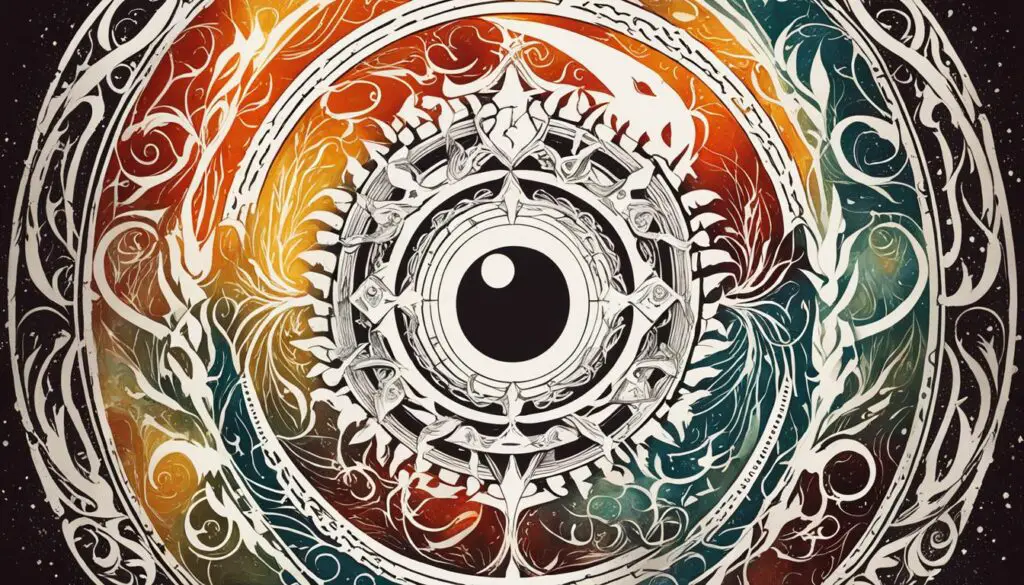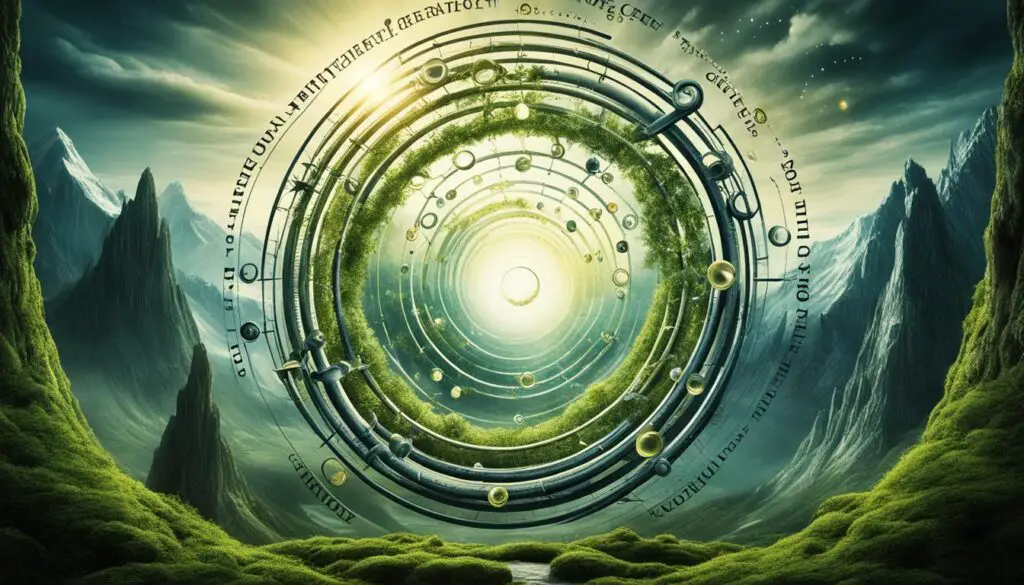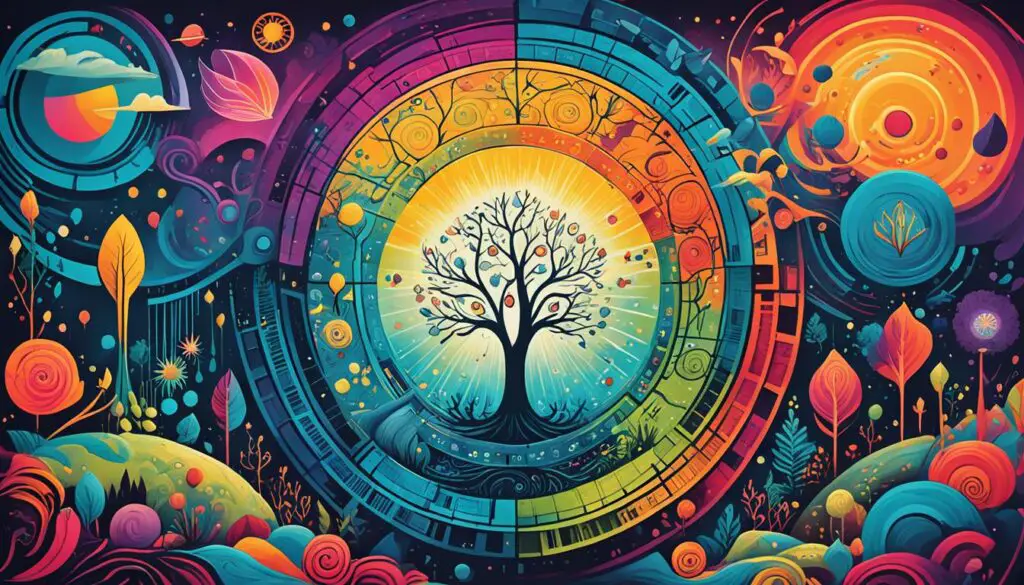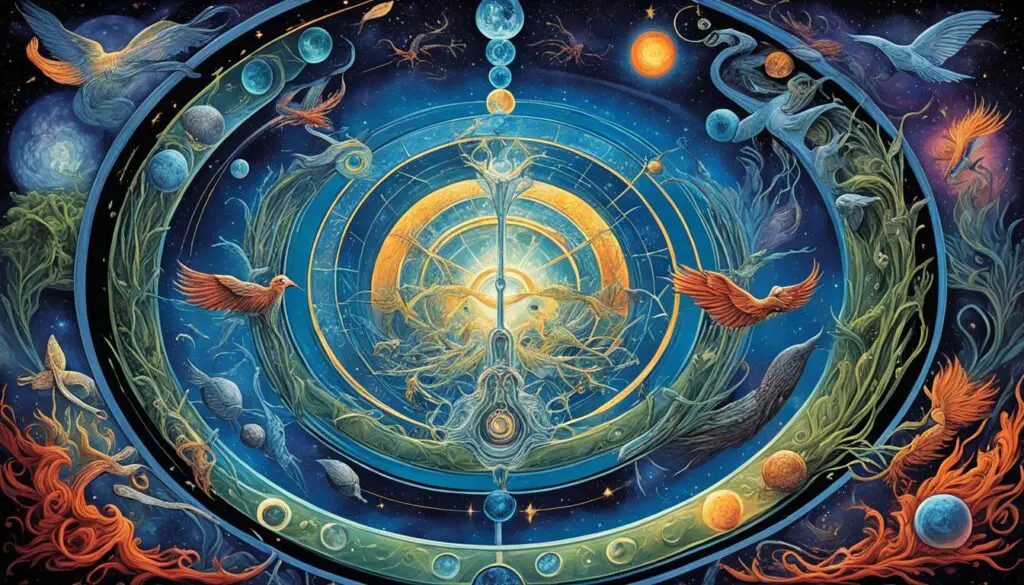The idea of Eternal Return, proposed by Friedrich Nietzsche, is one of the most intriguing and mysterious concepts in philosophy. Nietzsche describes the Eternal Return as a joyful truth, an idea that would be welcomed by someone who loves life to the fullest. The doctrine of Eternal Return suggests that, due to the finiteness of the energy of the universe, each person will live their life again, repeating the same moments and experiences, in an infinite cycle in time. Nietzsche considers the Eternal Return as a way of testing people's attitude towards life and an opportunity to reflect on the value and meaning of existence.
Key Findings
- The Eternal Return is a complex philosophical concept proposed by Nietzsche
- It challenges the traditional conception of immortality and offers a unique perspective on ethics, morality and personal transcendence
- The Eternal Return invites each individual to reflect on their choices, seek self-knowledge and deeply love life
- The idea of experiencing everything again in an eternal cycle can lead to a reframing of moments lived and a greater appreciation of experiences.
- The thought of Eternal Return can be confrontational, confronting one's own mortality and challenging the ephemeral nature of life
The Origin of Eternal Return
Nietzsche first mentioned the Eternal Return in his work “The Gay Science”. While hiking in the mountains of Switzerland, the idea came to his mind and he decided to explore it. However, it is important to highlight that Nietzsche never claimed that the Eternal Return is a literal truth, but rather a thought experiment to test our attitude towards life.
In “The Will to Power”, Nietzsche dedicated an entire section to the Eternal Return, taking seriously the possibility that this doctrine was true. He delves into reflection on the eternal repetition of life cycles and the challenges that this idea can bring to understanding the value and meaning of existence.

“The idea of Eternal Return is one of the most intriguing proposed by Nietzsche. It challenges our traditional view of time and invites us to question how we live our lives in the present.”
Nietzsche, by introducing the concept of Eternal Return, presents a new perspective on the cyclical nature of existence and the importance of reflecting on our actions and decisions. We will explore this fascinating concept and its philosophical implications further throughout this article.
The Concept of Eternal Return
The Eternal Return is a philosophical concept proposed by Friedrich Nietzsche that invites us to reflect on the cyclical nature of existence. According to Nietzsche, if we consider the finiteness of matter and energy in the universe, and the fact that there are a finite number of ways in which things can be arranged, then all possibilities would have already occurred and would occur again in an infinite cycle of time. . This means that each person would live their life again, repeating the same moments and experiences.
Nietzsche considered the Eternal Return as a way of selecting and assigning value to moments in life that really deserve to be lived. As we face the prospect of living it all again, we are led to reflect deeply on how we are living our lives and what choices we are making.
This concept challenges the traditional idea of a single linear life, considering existence as an eternal cycle. As we face the possibility of the Eternal Return, we are invited to embrace all facets of life, including difficult and challenging moments, as an opportunity for growth and transformation.
When considering the Eternal Return, we are invited to reflect deeply on the value and meaning of our existence, and to seek a life worth living.
This concept invites us to constantly reflect on our own conduct, our purpose and our choices. It reminds us of the responsibility we have to live our lives consciously, ethically and morally. Furthermore, Eternal Return challenges us to seek self-knowledge and self-realization, aiming for personal growth that allows us to live a full and meaningful life.
Eternal Return is one of the most striking concepts in Nietzsche's philosophy. His proposal to live everything again in an eternal cycle leads us to question our traditional ideas about death, transcendence and the purpose of life. By embracing this perspective, we can discover new meaning and value in existence, living each moment with intensity and appreciation.

Main points about the concept of Eternal Return:
- The Eternal Return proposes an eternal cycle of repetition of our lives;
- The finite amount of matter and energy in the universe implies that all possibilities would have already occurred and would occur again in the future;
- The Eternal Return is seen by Nietzsche as a form of selection and attribution of value to moments of life that deserve to be lived;
- This concept challenges the traditional idea of a single linear life, inviting us to embrace all facets of existence;
- The Eternal Return challenges us to reflect on our conduct, purpose and choices, seeking ethics, morality and self-realization;
- By embracing the perspective of Eternal Return, we can discover new meaning and value in existence, living each moment with intensity and appreciation.
The Meaning of Eternal Return
The Eternal Return brings to light reflections on the purpose of life and the search for the meaning of existence. Nietzsche suggests that, if each person were certain that they would live their life again, this could lead to a reframing of the moments lived and a greater appreciation of experiences. The Eternal Return also raises questions about ethics and morals, inviting individuals to reflect on their conduct and choices.
The concept of Eternal Return, proposed by Friedrich Nietzsche, goes beyond a simple philosophical idea. It brings with it a powerful proposal for reframing of life and an invitation to reflect on the value and meaning of existence. Through this doctrine, Nietzsche leads us to consider the possibility of reliving our life in an eternal cycle, repeating the same moments and experiences infinitely.
Imagine the following situation: if you were certain that you would live your life again in an infinite cycle, how would this influence the way you live today? This is one of the main questions raised by Eternal Return. When we confront the idea of repeating each choice, each action and each experience, we are invited to reflect on the value of the moments lived and to give a new meaning to our existence.
The Eternal Return challenges us to look at our lives in a deeper and more conscious way. We become responsible for every act, every decision and every experience we have. And this responsibility leads us to question not only our individual actions, but also our conduct towards others and the world around us.
“The Eternal Return can be seen as an opportunity to reflect on our conduct and evaluate whether we are living in accordance with our values and principles.” – Friedrich Nietzsche
When reflecting on the Eternal Return, we are invited to examine the ethics and morals of our existence. The doctrine invites us to question whether we are living according to our own principles, whether we are acting ethically, and whether we are contributing to the well-being of the world.
The Value of Existence
The Eternal Return also leads us to rethink the value of our own existence. If we were certain that we would live our lives over and over again, this could encourage us to give new meaning to the moments we live. Each experience, no matter how insignificant it may seem, becomes valuable and unique. Appreciating every moment, every encounter and every challenge becomes a way of affirming life and finding a deep meaning in our existence.
For Nietzsche, the Eternal Return does not mean a search for constant pleasure or the absence of suffering. On the contrary, he invites us to embrace all aspects of life, including suffering, as an ultimate expression of love for existence. It is through acceptance and transformation of these experiences that we can find true fulfillment and wholeness.

The Eternal Return, therefore, is much more than a simple philosophical theory. It is a powerful tool for reflection that invites us to look at our lives more deeply, to rethink our choices and find a higher meaning. By reframing our existence, we can experience a profound and enriching transformation, living each moment with greater awareness and appreciation.
The Impact of Eternal Return on Existence
The thought of Eternal Return can be conflicting, leading people to confront their own mortality and the ephemeral nature of life.
Nietzsche describes the initial reaction as a possible collective despair, as the human condition can be seen as tragic and the thought of experiencing everything again in a cyclical way can seem terrible.
However, Nietzsche also considers the possibility that someone can welcome the Eternal Return as an affirmation of life, embracing all aspects of it, including suffering, as an ultimate expression of love for existence.

Reflections on Mortality
When faced with the idea of Eternal Return, we are forced to deal with the finiteness of our existence and face the inevitability of death. This confrontation can awaken a deep reflection on the meaning and purpose of our lives. The thought of reliving it all over again can lead us to question how we are spending our time, what our priorities are, and how we can find true fulfillment in the face of life's transience.
“The Eternal Return challenges us to explore our relationship with mortality. Instead of moving away from it, we are invited to embrace it as an intrinsic part of the cycle of existence. It encourages us to live fully, appreciate every moment and find value even in the ephemeral.”
When we understand that each moment is unique and unrepeatable, we are encouraged to value life in its entirety, regardless of its brevity. The Eternal Return invites us to find meaning and purpose even in the face of mortality, to explore the love of existence, and to embrace all aspects of life, whether joyful or painful.
| Impact of Eternal Return on Existence | Reactions |
|---|---|
| Initial conflict | Collective despair in the face of the finiteness of life |
| Life affirming | Embrace all aspects of existence, including suffering, as the ultimate expression of love for life |
Religion and the Eternal Return
Nietzsche's concept of Eternal Return differs from traditional religious beliefs, which see the world as inferior to a divine plan and earthly life as a mere preparation for a better life after death. For Nietzsche, the Eternal Return offers a distinct perspective on immortality, involving the idea that each individual will have the opportunity to live their life again, transcending their personal existence and finding meaning and value in earthly life.
While religions often seek transcendence as a way to escape the cycle of life and death, Eternal Return challenges this perspective, encouraging reflection on how to find meaning in the here and now. Rather than waiting for a better future life, Eternal Return invites each individual to fully embrace their current existence and find value in every moment lived.
“The Eternal Return calls us, not just to follow a specific set of principles or doctrines, but to love and affirm life in its entirety, including the joys and sufferings it brings with it.” – Friedrich Nietzsche
This Eternal Return approach contrasts with the religious view of personal transcendence, in which earthly life is seen as a mere interval before salvation or redemption. For Nietzsche, the personal transcendence it occurs not on a divine plan, but rather in the constant repetition of the cycles of life. It is by finding meaning and value in each repetition that each individual transcends their personal existence and finds true fulfillment.
Thus, Eternal Return challenges traditional conceptions of immortality and offers a unique way of understanding the meaning of life. It is not necessary to wait or depend on a better future life, but rather to fully appreciate and value each present moment, finding personal transcendence through the acceptance and affirmation of earthly life.

Personal transcendence through the Eternal Return
The Eternal Return challenges both traditional religious views and materialist conceptions of existence, proposing a unique perspective of transcendence. By embracing the idea of living it all over again and finding value in each repetition, each individual can achieve deep personal transcendence and an intimate connection with their own existence.
This notion of personal transcendence through the Eternal Return involves a change of perspective in relation to earthly life, no longer as a passing or preparatory stage, but rather as the very essence of human experience. By transcending the search for a better future life, the focus turns to the search for meaning and value in each moment lived.
Rather than seeking transcendence through dogma or abstract notions of a divine plan, Eternal Return invites each individual to find transcendence in the very process of living and experiencing life to its fullest. It is through this approach that the Nietzsche's philosophy reveals a unique vision of personal transcendence, centered on valuing earthly life and finding meaning and value in each repetition of the life cycle.
The Search for Self-Knowledge and Self-Realization
The Eternal Return leads us to a deep reflection on ourselves and the choices we make in our lives. Nietzsche argues that those who can embrace the idea of experiencing everything again have the chance to reach a deeper level of self-knowledge and self-realization. This constant reflection and the search for a worthwhile life are central aspects of the Eternal Return philosophy.
Self-knowledge is a path to understanding our values, deepest desires and behaviors. It is a journey of internal exploration that allows us to discover who we truly are and how our experiences have shaped our identity.
Through the search for self-knowledge, we can learn to recognize our strengths and weaknesses, our limits and potential. This allows us to make more conscious and authentic decisions, aligned with our personal values and goals.
Self-actualization, in turn, is the process of reaching our full potential and finding satisfaction in our lives. It is the pursuit of realizing our dreams, goals and aspirations, cultivating a sense of purpose and meaning in everything we do.
“True self-realization is not the result of following the standards imposed by society or seeking external success, but rather of connecting with our essence, expressing our authenticity and living in harmony with our values and passions.”
Self-realization does not mean striving for perfection or achieving a state of constant happiness. It is a continuous process of personal growth, learning and evolution. It is recognizing that despite adversity, we can strive to live a life that is truly meaningful to ourselves.
The Eternal Return challenges us to reflect on who we are and how we live our lives. By embracing this idea, we are invited to examine our actions, choices and values, questioning whether we are truly living the way we want.
Seeking self-knowledge and self-realization, we can become active agents in creating our own lives, making conscious decisions aligned with our true self. It is a challenging but rewarding process that allows us to live a more authentic and fulfilling existence.
Benefits of Self-knowledge and Self-realization
The search for self-knowledge and self-realization brings countless benefits to our lives. Knowing yourself allows us to:
- Make more conscious decisions aligned with our values;
- Develop more authentic and meaningful relationships;
- Identify and enhance our skills and talents;
- Overcome obstacles and challenges with more resilience;
- Live a more satisfying and meaningful life;
- Create a sense of purpose and direction in our lives.
The search for self-knowledge and self-realization It is an ongoing process that requires time, effort and self-discovery. It is a unique journey for each individual, full of learning and opportunities for growth.
By embracing the philosophy of Eternal Return, we are invited to delve into a deep search for ourselves, exploring our most intimate truths and seeking a life worth living.

Ethics and Morals in Existence
The concept of Eternal Return raises profound questions about ethics and morality in existence. Nietzsche invites us to reflect on the responsibility of our actions, considering that each action and choice we make could be repeated eternally. In this sense, the Eternal Return implies living our lives consciously and ethically, constantly seeking to improve and contribute to the well-being of the world.
When we are faced with the possibility of living it all over again, we are challenged to reflect on the consequences of our actions and to consider the impact that our choices have not only on ourselves, but also on the society around us. The Eternal Return invites us to develop a deep sense of ethical responsibility in relation to our decisions, taking into account the intrinsic value of each moment and the influence they have on the course of existence.
“If every second of our life must be lived again eternally, then each action is of infinite value, because even if a single action could be changed, the entire universe would be transformed.” – Friedrich Nietzsche
The Eternal Return challenges us to seek a high standard of moral conduct, recognizing that each act can have a lasting impact on the fabric of existence. This leads us to reflect on the importance of honesty, justice, compassion and empathy in our relationships with others. Furthermore, it invites us to examine our values and question the validity of established ethical and moral systems, in search of an ethics forged by our own reflection and personal experience.
Therefore, when contemplating the Eternal Return and its implication ethics and morals in existence, we are encouraged to live authentically, seeking to develop a life that is truly meaningful and in line with our deepest values. Eternal Return challenges us, inspires us and invites us to be active agents of change and to contribute, intentionally, to a better world.
The Importance of Love for Life
For Nietzsche, embracing the idea of Eternal Return is expressing a deep love for life, including all its painful and challenging aspects. The Eternal Return invites each person to affirm life in its entirety and to embrace their destiny with all its nuances. Love of life becomes a supreme value, leading to personal transcendence and the search for a fulfilling existence.
The Eternal Return and the Relationship with Religions
Nietzsche's doctrine of Eternal Return conflicts with some religions that see the earthly world as inferior and life as a preparation for something beyond. The idea of an eternal return goes against the belief in an afterlife and challenges the traditional conception of transcendence. This divergence made Nietzsche's Eternal Return one of his most popular and controversial philosophical ideas of the 20th century.
The Eternal Return and the Distinct Notion of Immortality
The Eternal Return offers a unique vision of immortality. Rather than seeking eternity on a spiritual or transcendental plane, Nietzsche suggests that immortality lies in the tireless repetition of the cycles of life. He proposes a separation between the parts of life that are worth living and those that deserve to perish. The Eternal Return invites each individual to reflect on how they are living and to value the experiences that really matter.

When we think of immortality, we usually associate it with the idea of an eternal existence in a spiritual or transcendent realm. However, Nietzsche proposes a completely different view of this concept. For him, true immortality lies in the tireless repetition of the cycles of life. The Eternal Return challenges the traditional idea that life is just a passage to something beyond, placing it as the very purpose and meaning of existence.
Nietzsche argues that, when we face the possibility of everything repeating itself eternally, we are led to reflect on how we are living. In an infinite cycle of time, all of our actions and choices would be repeated tirelessly. Therefore, the need arises to separate what is truly worth living from what deserves to perish.
It distinct notion of immortality invites us to value the experiences that really matter, to seek a full and meaningful life. Immortality is not related to an infinite extension of existence, but rather to the way we live in the present. Every moment becomes precious because we know it will be repeated indefinitely.
“The Eternal Return poses a challenge: how do you live your life when you know you will have to live it again and again?”
This unique perspective offered by Eternal Return invites us to rethink our actions and choices, to seek an authentic and meaningful existence. Instead of conforming to the idea of a fleeting life, we are encouraged to live intensely, valuing each experience and learning.
Reflecting on our choices
The Eternal Return leads us to a deep questioning about the meaning of existence and the responsibility we have for our own lives. If every action and choice we make were repeated forever, how would we feel about them?
This reflection invites us to seek ethical and morally responsible conduct, to make conscious decisions and to consider the consequences of our actions. The Eternal Return teaches us that we cannot escape the repercussions of our choices, as they will be repeated over and over again. Therefore, we must act in a way that contributes to the well-being of the world and ourselves.
As we embrace distinct notion of immortality proposed by the Eternal Return, we can find a path to a full and meaningful life. By recognizing the value of experiences that really matter, we can seek self-knowledge, self-realization and a deep love for existence.
Conclusion
The Eternal Return, proposed by Nietzsche, is a complex and intriguing philosophical concept that makes us reflect on the value and meaning of existence. The idea of experiencing everything again in an eternal cycle invites us to question our choices, to seek self-knowledge and to deeply love life. This concept challenges traditional conceptions of immortality and provides a new perspective on ethics, morality and personal transcendence.
By opening ourselves to the possibility of the Eternal Return, we find a path to self-improvement and full fulfillment on our journey to self-knowledge. He challenges us to reevaluate our actions and take responsibility for them, as each choice will have consequences that will be repeated countless times throughout the cycles. In this way, we are invited to live consciously, ethically and value the moments that really matter.
The Eternal Return provokes us to reflect on the purpose of life and confronts us with the finiteness and ephemerality of our existence. By adopting an attitude of love and acceptance for life in its entirety, including painful experiences, we can transcend our condition and find meaning in each moment we live. That existentialist philosophy invites us to embark on a journey of self-knowledge and discovery, in search of a full and fulfilled life.
FAQ
Q: What is Eternal Return?
A: The Eternal Return is a concept proposed by Friedrich Nietzsche in philosophy. He describes it as a joyful truth that suggests that each person will live their life again, repeating the same moments and experiences, in an infinite cycle in time. The Eternal Return is a way of testing our attitude and reflecting on the value and meaning of existence.
Q: How did Eternal Return come about?
A: Nietzsche first mentioned the Eternal Return in his work “The Gay Science”. He reported that the idea came to him while he was hiking in the mountains of Switzerland. Nietzsche took seriously the possibility of this doctrine being true and dedicated an entire section of his work “The Will to Power” to the Eternal Return.
Q: What is the meaning of Eternal Return?
A: The Eternal Return brings reflections on the purpose of life and the search for the meaning of existence. Nietzsche suggests that, if each person were certain that they would live their life again, this could lead to a reframing of the moments lived and a greater appreciation of experiences.
Q: How does Eternal Return impact existence?
A: The Eternal Return invites each individual to reflect on mortality and the ephemeral nature of life. It also raises questions about ethics and morals, inviting people to reflect on their conduct and choices.
Q: What is the relationship of Eternal Return to religion?
A: Eternal Return differs from traditional religious beliefs, which see the world as inferior to a divine plan and earthly life as a preparation for a better life after death. For Nietzsche, the Eternal Return offers a distinct perspective on immortality, finding meaning and value in earthly life.
Q: How is Eternal Return related to self-knowledge and self-realization?
A: The Eternal Return invites each individual to reflect on themselves and the choices they make in their lives. Nietzsche argues that those able to embrace the idea of living it all over again can reach a deeper level of self-knowledge and self-realization.
Q: How important are ethics and morals in existence?
A: The Eternal Return raises questions about ethics and morality in existence, demanding a deep reflection on the responsibility of our actions. It involves living consciously and ethically, constantly seeking to improve and contribute to the well-being of the world.
Q: Why is the love of life important in Eternal Return?
A: For Nietzsche, embracing the idea of Eternal Return is expressing a deep love for life, including all its painful and challenging aspects. The Eternal Return invites each person to affirm life in its entirety and to embrace their destiny with all its nuances.
Q: What is the relationship of Eternal Return to traditional religions?
A: Eternal Return conflicts with some religions, which see the earthly world as inferior and life as preparation for something beyond. The idea of an eternal return goes against the belief in an afterlife and challenges the traditional conception of transcendence.
Q: How does Eternal Return differ from the traditional notion of immortality?
A: The Eternal Return proposes a distinct vision of immortality. Instead of seeking eternity on a spiritual or transcendental plane, Nietzsche suggests that immortality lies in the tireless repetition of the cycles of life, valuing and giving meaning to lived experiences.






